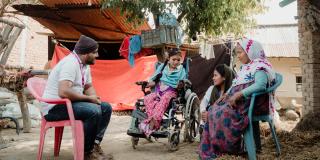
One concept that holds back the journey towards inclusivity is Othering.
While it is not a term often thrown around in everyday conversation, its impact on our societies can be profound and far-reaching. In this article, I’ll be unpacking what this means, why it matters, and how we can dismantle its divisive influence as active citizens.
Simply put, Othering is the process in which individuals or groups are deemed different based on characteristics such as race, ethnicity, religion, gender, sexual orientation, or socioeconomic status. These categories can create an "us versus them" mentality, fostering a sense of superiority among the dominant group while positioning the other as inferior.
Ranging from subtle biases to overt discrimination and exclusion, Othering is fuelled by prejudice, fear, and power dynamics resulting in social and gender discrimination, injustice, and conflict within communities. However, to understand the gravity of Othering, we must recognise its presence on both an individual and institutional level, embedded in our interactions, societal norms, policies, and structures.
Historically, various groups have been victims of Othering. Women, members of the LGBTQI+ community, people with disabilities, minority ethnicities, refugees, and migrants among others, have faced detrimental consequences because of being perceived as different. When we "other" someone, we strip away their humanity, dignity, and right to belong. It perpetuates a cycle of exclusion that hinders social progress, and fosters an environment where inequality thrives.
At VSO, we seek to confront Othering head-on. At the heart of our mission is a commitment to challenge stereotypes and dismantle inequalities. We facilitate learning and reflection through specialised training on social exclusion and empower our staff, volunteers, and partners to understand, and combat the damaging effects of Othering. But what are some of the steps that we need to take to make a change?
1.Acknowledge and challenge personal biases
Take a moment to reflect on your own biases. By acknowledging them, you take the first step towards dismantling the walls of Othering.
2.Cultural open-mindedness
Embrace cultural humility. Challenge the belief that your way is inherently superior and recognise the value in diverse perspectives.
3. Mindful language
Language matters. Be aware of how your words may contribute to Othering. Choose language that fosters inclusivity and avoids perpetuating harmful stereotypes.
4.Recognise intersectionality
Identities are multifaceted and interconnected. Understand that individuals can belong to multiple groups based on various aspects of their identity.
5. Speak up
Don't be a silent bystander. Challenge biased behaviour when you see it. By making Othering socially unacceptable, you contribute to the creation of a more inclusive society.
These steps are not exhaustive, but they provide a foundation for fostering inclusivity. By thinking about and sharing your own insights and experiences on combating Othering, we can collectively contribute to an ongoing dialogue that promotes acceptance, understanding, and unity.
Join the conversation on Linkedin using the hashtags
#WeVolunteerFor #SDGs #GlobalGoals #Inclusivity #Othering
Read more

Transforming lives through education: Geoffrey’s VSO legacy
With a deep belief in the transformative power of education, Geoffrey from Norfolk, UK, has devoted his life both in the UK and abroad to making education more accessible for all.

A ripple of change: how VSO volunteers are transforming communities
Every act of volunteering begins with a choice — a decision to act out of a desire to make a difference. Across the world, VSO volunteers are proving that one spark of action can ignite something much bigger.
